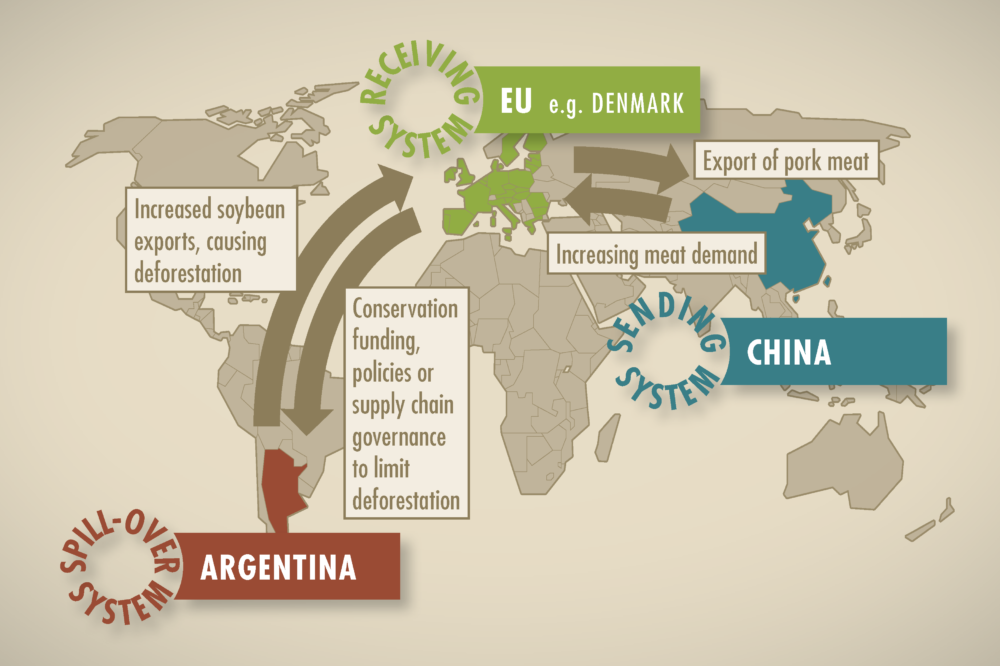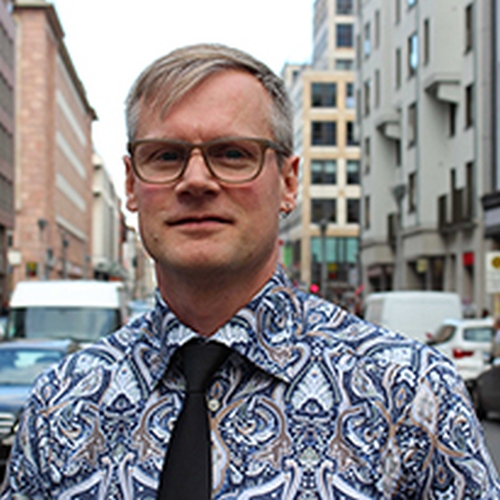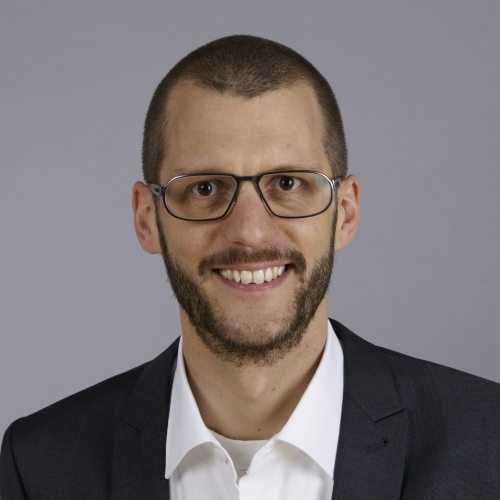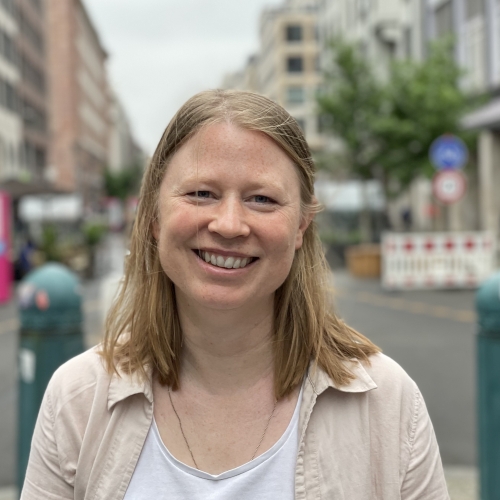THESys Project
COUPLED is a Marie-Skłodowska-Curie training network, coordinated by Humboldt University Berlin and funded by the European Commission (2018–2022). Fifteen doctoral students are supported by an experienced network of universities, companies, public institutions, and NGOs. Together we try to understand land use processes that link distant places (telecouplings) and how to govern these processes towards sustainability in an interconnected world. Activities include PhD projects, various internships, and training courses.
Land use and sustainability as key challenge of a globalized world
Land use is essential to our well-being and therefore central to many of the largest sustainability challenges of today, including global food security, climate change mitigation, and biodiversity conservation.
Finding pathways for a sustainable land use is challenging because of the complex processes of globalization that tie distant places together. For example, the products we consume are often directly or indirectly connected to far away land-use changes such as deforestation of the tropics.
These links are embedded in a net of long-distance flows of products and raw materials, but also of people, information, policies, technology, and capital. These complex flows are difficult to untie and lead in many places to abrupt and unexpected land-use changes.
Scholars in the field of land system science have started analysing such global connections through the concept of telecoupling. COUPLED puts the approach of telecoupling into action for contributing to a better understanding of processes and actors that influence land use in an increasingly interconnected world. By this, we aim to solve sustainability challenges for land use.
Research Objectives
-
- Operationalising the concept of telecouplings for solving sustainability challenges for land use and identifying actors and processes that impact land use over long distances
- Understanding what makes land-use systems sustainable in an increasingly interconnected world and how to get there
- Assessing the social, economic, and environmental impacts of sudden and unexpected changes in land use
- Identifying general conditions for sustainability while at the same time capturing specific local conditions
- Finding solutions to increase the efficiency of land use in a sustainable way, for example through strategic governance of international trade
Expected results
-
- Successful training of fifteen young researchers and establishment of a strong network in the field of land use and sustainability
- Discussion forum for research, business, government and civil society groups to bring together expertise on sustainable land use in a globalized world
- Contribution to the development of Land System Science
- Vivid case studies on land-use systems in the Global South and Europe and their interrelation
- Expertise on how to implement and promote sustainable land use and transfer scientific results to business, policy, and practice
More information: project website

Output
Monographs
Friis, C. & J. Østergaard Nielsen (2019): Telecoupling. Exploring Land-Use Change in a Globalised World. Palgrave Studies in Natural Resource Management. Cham: Palgrave Macmillan. https://doi.org/10.1007/978-3-030-11105-2. For more information see: Book Publication on Telecoupling – How Researchers track Land-Use Change in a Globalised World.
Journal Articles
Bager, S., U.M.Persson & T.N.P. dos Reis (2021). Eighty-six EU policy options for reducing imported deforestation. One Earth 4: 289-306, https://doi.org/10.1016/j.oneear.2021.01.011
Bager, S.L. & E.F. Lambin (2020). Sustainability strategies by companies in the global coffee sector. Business Strategy and the Environment 1-16. https://doi.org/10.1002/bse.2596
Bhan, M., S. Gingrich, N. Roux, J. Le Noe, T. Kastner, S. Matej, F. Schwarzmueller, K.-H. Erb (2021). Quantifying and attributing land use-induced carbon emissions to biomass consumption: A critical assessment of existing approaches. Journal of Environmental Management 286: 112228, https://doi.org/10.1016/j.jenvman.2021.112228.
Coenen, J., S. Bager, P. Meyfroidt, J. Newig & E. Challies (2020). Environmental Governance of China’s Belt and Road Initiative. Environmental Policy and Governance 1–15. https://doi.org/https://doi.org/10.1002/eet.1901
dos Reis, T.N.P., P. Meyfroidt, E.K.H.J. zu Ermgassen, C. West, T. Gardner, S. Bager, S. Croft, M.J. Lathuillière, J. Godar (2020). Understanding the Stickiness of Commodity Supply Chains Is Key to Improving Their Sustainability. One Earth 3(1):100-115, https://doi.org/10.1016/j.oneear.2020.06.012
Frohn Pedersen, A., J. Ø. Nielsen, C. Friis & J. Bosse Jønsson (2021). Mineral exhaustion and its livelihood implications for artisanal and small-scale miners. Environmental Science and Policy 119:34-43, https://doi.org/10.1016/j.envsci.2021.02.002
Hauer, J. & J. Østergaard Nielsen (2020). Making land-use change and markets: the globallocal entanglement of producing rice in Bagré, Burkina Faso. Geografiska Annaler: Series B, Human Geography. https://doi.org/10.1080/04353684.2020.1723121
Kehoe, L., T.N.P. dos Reis, P. Meyfroidt, S. Bager, R. Seppelt, T. Kuemmerle, E. Berenguer, M. Clark, K. Frankel Davis, E. K.H.J. zu Ermgassen, K.N. Farrell, C. Friis, H. Haberl, T. Kastner, K.L. Murtough, U.M. Persson, A. Romero-Munoz, C. O’Connell, V.V.Schafer, M. Virah-Sawmy, Y. le Polain de Waroux, J Kiesecker (2020). Inclusion, Transparency, and Enforcement: How the EU-Mercosur Trade Agreement Fails the Sustainability Test. Commentary. One Earth 3:268-272. https://doi.org/10.1016/j.oneear.2020.08.013
Laroche, P.C.S.J. , C.J.E.Schulp, T. Kastner, P.H.Verburg (2020). Telecoupled environmental impacts of current and alternative Western diets. Global Environmental Change 62. https://doi.org/10.1016/j.gloenvcha.2020.102066
Leijten, F., S. Sim, H. King & P.H. Verburg (2020). Which forests could be protected by corporate zero deforestation commitments? A spatial assessment. Environmental Research Letters 15:064021. https://doi.org/10.1088/1748-9326/ab8158
Meyfroidt, P., R. Roy Chowdhury, A. de Bremond, E.C. Ellis, K.H. Erb, T. Filatova, R.D. Garrett, J.M. Grove, A. Heinimann, T. Kuemmerle, C.A. Kull, E.F. Lambin, Y. Landon, Y. le Polain de Waroux, P. Messerli, D. Müller, J.Ø. Nielsen, G.D. Peterson, V. Rodriguez García, M. Schlüter, B.L. Turner II, P.H. Verburg (2018). Middle-range theories of land system change. Global Environmental Change 53:52–67. https://doi.org/10.1016/j.gloenvcha.2018.08.006
Munroe, D.K., M. Batistella, C. Friis, N.I. Gasparri, E. Lambin, J. Liu, P. Meyfroidt, E. Moran, J. Østergaard Nielsen (2019). Governing flows in telecoupled land systems. Current Opinion in Environmental Sustainability 38:53-59. https://doi.org/10.1016/j.cosust.2019.05.004
Nielsen, J.Ø., A. de Bremond, R. Roy Chowdhury, C. Friis, G. Metternicht, P. Meyfroidt, D. Munroe, U. Pascual, A. Thomson (2019). Toward a normative land systems science. Current Opinion in Environmental Sustainability 38:1-6. https://doi.org/10.1016/j.cosust.2019.02.003
Otero, I., K.N. Farrell, S. Pueyo, G. Kallis, L. Kehoe, H. Haberl, C. Plutzar, P. Hobson, J. García-Márquez, B. Rodríguez-Labajos, J.-L. Martin, K.-H. Erb, S. Schindler, J. Nielsen, T. Skorin, J. Settele, F. Essl, E. Gómez-Baggethun, L. Brotons, W. Rabitsch, F. Schneider, G. Pe’er (2020). Biodiversity policy beyond economic growth. Conservation Letters e12713 https://doi.org/10.1111/conl.12713
Parra Paitan, C. & P.H. Verburg (2019). Methods to Assess the Impacts and Indirect Land Use Change Caused by Telecoupled Agricultural Supply Chains: A Review. Sustainability 11:1162. https://doi.org/10.3390/su11041162
Qin, S., R.E. Golden Kroner, C. Cook, A.T. Tesfaw, R. Braybrook, C.M. Rodriguez, C. Poelking, M.B. Mascia (2019). Protected area downgrading, downsizing, and degazettement as a threat to iconic protected areas. Conservation Biology 33 (6):1275-1285. https://doi.org/10.1111/cobi.13365
Roux, N.,T. Kastner, K.-H. Erb, H. Haberl (2021): Does agricultural trade reduce pressure on land ecosystems? Decomposing drivers of the embodied human appropriation of net primary production. Ecological Economics 181:106915, https://doi.org/10.1016/j.ecolecon.2020.106915
Russo Lopes, G., M.G. Bastos Lima, T.N.P. dos Reis (2021): Maldevelopment revisited: Inclusiveness and social impacts of soy expansion over Brazil’s Cerrado in Matopiba. World Development 139:105316, https://doi.org/10.1016/j.worlddev.2020.105316
Sonderegger, G., C. Oberlack, J. C. Llopis, P. H. Verburg, and A. Heinimann. 2020. Telecoupling visualizations through a network lens: a systematic review. Ecology and Society 25(4):47. https://doi.org/10.5751/ES-11830-250447
Billions of Dollars, millions of traded tons & millions of connections: the Brazil soy supply chain. A video by Tiago Reis on his study of connections between producing municipalities, traders & consumer countries. Why do some change, why do some remain stable?
Does trade help to achieve SDGs? Or do we need different trade regulations?
Nicolas has six minutes to discuss whether or not international trade in agricultural products did reduce pressure in land ecosystems. Does he pass the Peacha Kucha challenge? Look for yourself.
Meet some COUPLED members and get a short insight into our training network. It was filmed during our Summer School last July in Berlin and surroundings. Thanks to Anna Frohn Pedersen for putting it together.
Do you ever ask yourself where your golden jewellery was born?
It might well be right here, in Tanzania. Extracting gold is what employs hundreds of thousands Tanzanians and gives them food on the table. But it comes with a price that both the people and the environment will eventually pay. 60Seconds is an urban video festival projecting selected silent short films. Anna‘s short film Gold was selected and presented in April 2020.
Contact

Jonas Nielsen
Coordinator
Email:

Tobias Kümmerle
Co-Coordinator
Email:

Kathrin Trommler
Project Manager
Email:


